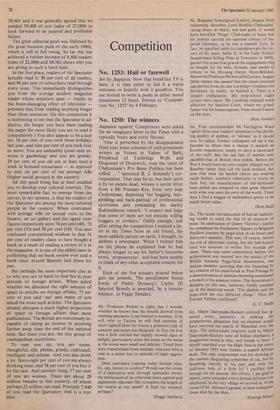No. 1250: The winners
Jaspistos reports: Competitors were asked for an imaginary letter to the Times with a typically fruity and nutty flavour.
'One is perturbed by the disappearance from your letter columns of such prominent writers as Volens et Valens of Bath, Perplexed of Tunbridge Wells and Disgusted of Droitwich; even the voice of Cheltenham's Pro Bono Publico has been stilled ...' lamented B. J. Kennedy's cor- respondent. That may be so, but their spirit is by no means dead, witness a recent letter from a Mr Pennant-Rea, from very near Cheltenham, deploring 'the hugging, hair- stroking and back-patting' of professional sportsmen and containing the darkly Bultitudinous remark: 'I suspect and hope that some of them are not entirely willing huggers or strokers.' Oddly enough, just after setting the competition I noticed a let- ter in the Times from an old friend, the most unlikely person on earth, I thought, to address a newspaper. When I twitted him on the phone he explained that he had always longed to use his father's favourite word, 'preposterous', and had been unable to think of any other acceptable context for it.
Each of the five winners printed below gets ten pounds. The penultimate bonus bottle of Pedro Domecq's Carlos III Selected Brandy is awarded, by a leonine whisker, to Peggy Sandars.
Sir, Professor Peskitt is right; but I wonder whether he knows that the benefit derived from wearing spectacles is not limited to humans. If he will refer to Tacitus he will find mention of short-sighted lions for whom a primitive type of concave spectacles was designed. At first the lion was a little startled but rapidly showed signs of delight, particularly when the items on the menu at the arena were small and delicate. Timid lions were transformed from hesitant creatures with a roar in a minor key to animals of eager aggres- sion.
Does veterinary training today include visits by, say, horses to oculists? Would not the vision of a racecourse seen through spectacles ensure the enthusiasm of an otherwise short-sighted and apparently reluctant filly to explore the length of the course at top speed? A field for research perhaps?
(Peggy Sandars)
Sir, Brigadier Scattergood (Letters, August 23rd) incorrectly describes Lord Boddily-Clinkscales' racing livery as black, red and gold. It would have horrified 'Pingo' Clinkscales to learn that his jockeys sported the national colours of Im- perial Germany, as he was a staunch Tory. In fact, he specified sable (to commemorate the vic- tory of his mare, Sable II, in the Lady Schlizzi Steeplechase Selling Plate at Towcester in 1893), garnet (the stone that graced the engagement ring he bought for his wife, Ariane), and amber (a tribute to his life-long friend, Hore-Belisha). Moreover, Professor Bickerstaffe (Letters, August 26th) repeats the canard that the claret-coloured cap derives from his late Lordship's fondness for Bordeaux. In reality, he loathed it. There is a simpler explanation. His prep-school rugby jerseys were claret. His Lordship retained warm affection for Seaford Court, where my grand- father was his house captain, from whom I learn- ed the story.
(Ron Jowker) Sir, Your correspondent Mr Farrington Ward rightly drew your readers' attention to the declin- ing quality of dubbin, or `nikwax' as it should now be called. Former colleagues tell me it has become so dilute that a sherpa is needed on Everest expeditions simply to carry a haversack of the stuff. But the sad fate of dubbin only parallels that of British shoe polish. Before the War I would have my own supply shipped out to Bombay rather than risk the local product, but now that even the landed classes are wearing suede leather, synthetic substitutes or worse on their feet, the manufacturers of old-fashioned boot polish are tempted to take great liberties with what was once the envy of the world. These days I find a noggin of methylated spirits to be much better value.
(Rob Hull)
Sir, The recent recrudescence of hot-air balloon- ing recalls to mind the feat of an ancestor of mine. In celebration of Queen Victoria's jubilee he completed the Parliament Square to Brighton Pavilion journey by pogo-stick in six hours and thirty-two minutes. This was, of course, before the era of electronic timing, but the half-hunter used was accurate to within five seconds per diem. There was some controversy before this achievement was entered into the annals of the British Amateur Pogo-Stick Association, one jealous member asserting that the financing by my relative of his meal-break at Peas Pottage by a demonstration of diabolo-throwing constituted a breach of his amateur status. The Association's decision on this was, however, finally summed up in the immortal words: 'The diabolo and the pogo-stick are two different things.' Thus are Eternal Verities confirmed!
(I. C. Snell)
Sir, Major Dalrymple-Hockett (retired) has ig- nored every authority in making the preposterous allegation that no elephant would have survived the march of Hannibal over the Alps. The unfortunate creatures used by Major Dalrymple-Hockett were all Indian elephants, a languorous breed at best, and female to boot. I myself marched over the High Jura in the worst of January 1933 with Jumbo, a superb African male. The only contretemps was his showing at the summit disquieting symptoms of rut, but by breathing fiercely in his ears and with the judicious help of a little kif I pacified him enough for the descent. His efforts, I am glad to report, were rewarded with a buxom African cosy employed, in the very village we arrived at, in the circus of M. Alfonse Legrand, in later unhappier times shot by the Hun.
Moor) (George






































 Previous page
Previous page